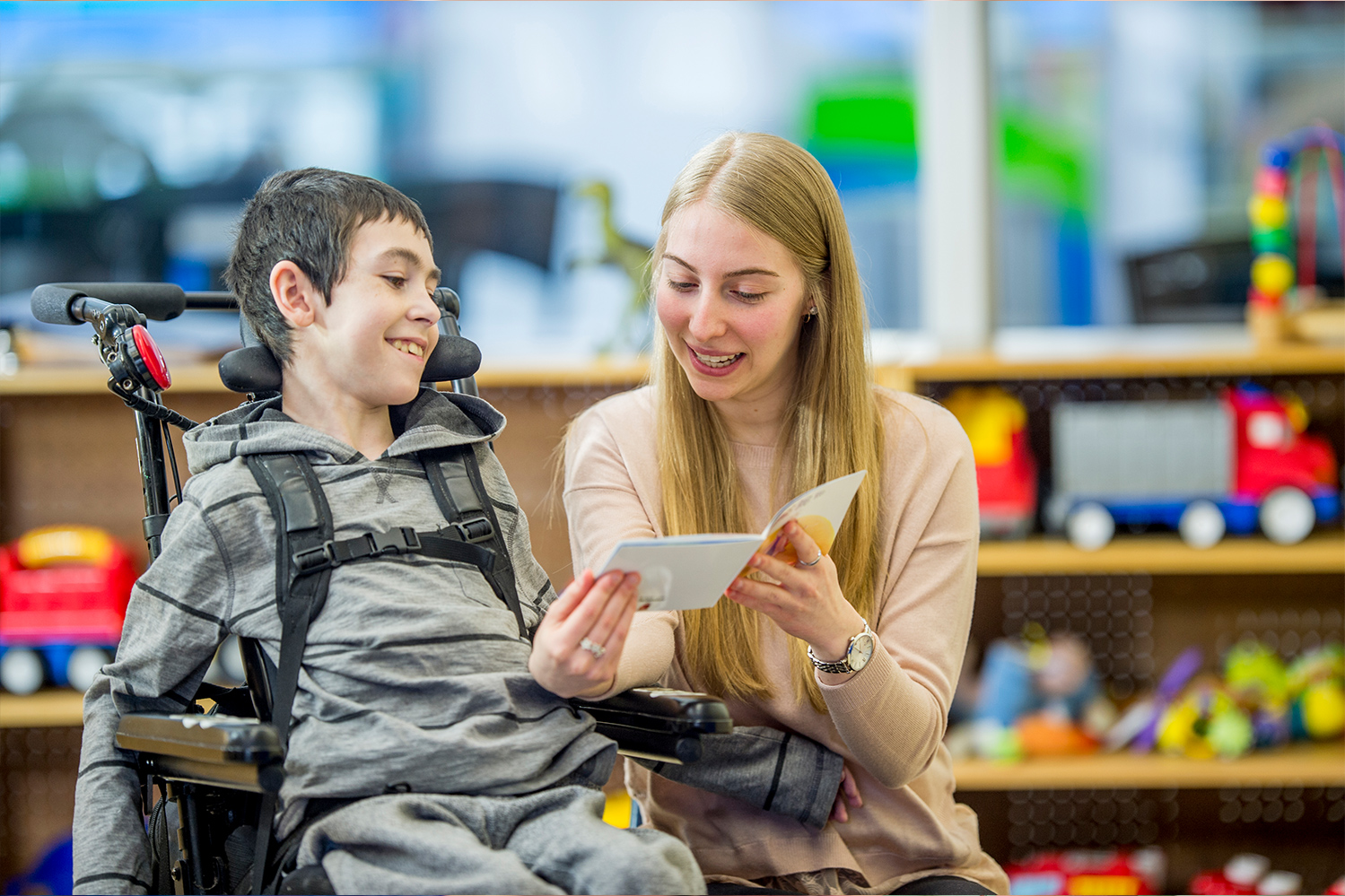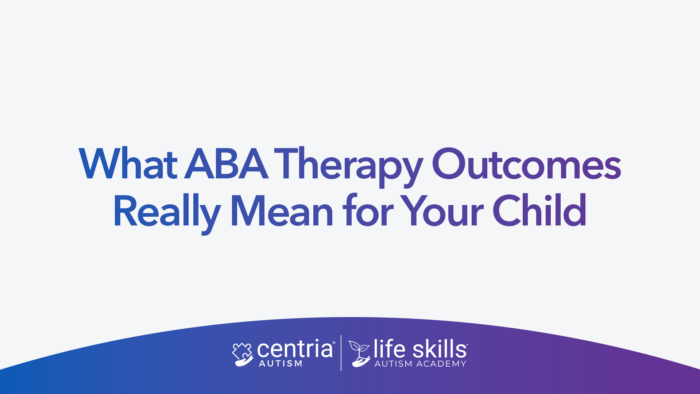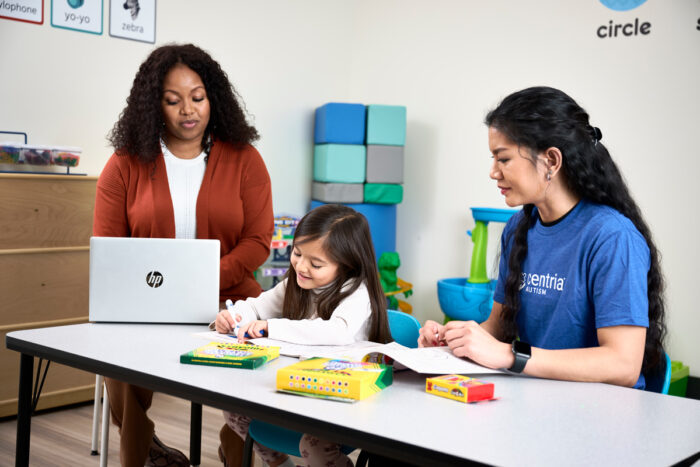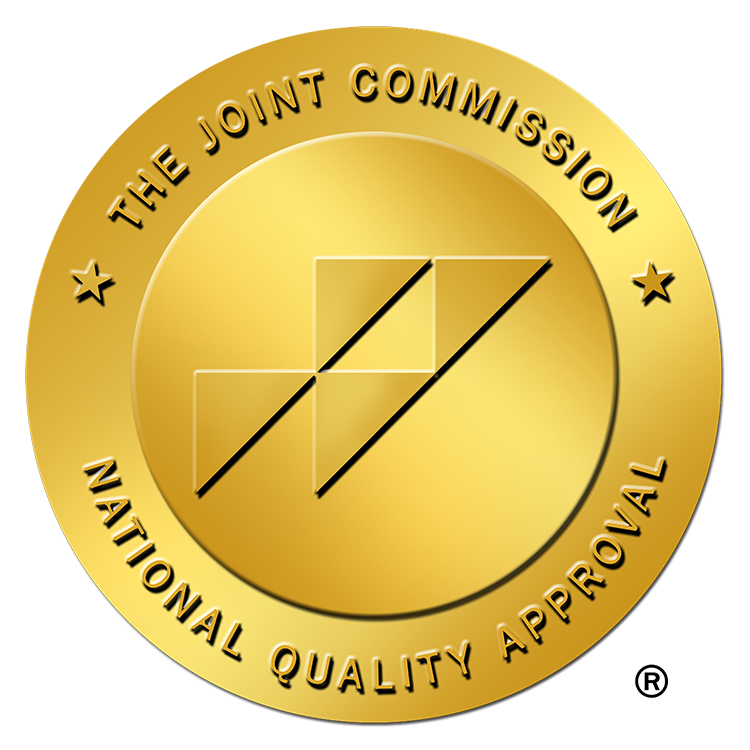It is natural for a parent or caregiver to feel overwhelmed, anxious, or confused when seeking an autism diagnosis for their child. At Centria, our Licensed Psychologists provide comprehensive in-person diagnostic evaluations.
During the evaluation process, a clinician will gather information about your child through interviews, observation, and direct assessment. The goal of the diagnostic evaluation is to gain insights into your child’s skills across multiple developmental areas, including:
- Communication/language abilities
- Social skills
- Cognitive abilities, and
- Daily functioning
This allows the clinician to make an accurate diagnosis.
The information gained through the diagnostic evaluation will enable the practitioner to make detailed recommendations for interventions, therapies, and support services tailored to your child’s individual needs.
What does a Diagnostic Evaluation for Autism include at Centria?
While the process may vary slightly (e.g., specific tests used) based on various factors such as child’s age, payer requirements, etc., all diagnostic evaluations at Centria Autism include the same core components.
1. Information Gathering
The clinician may ask you to complete a form prior to your first appointment for the purpose of collecting information about your family history, your child’s early developmental milestones, and any important medical information (e.g., previous diagnoses, history of seizures, genetic abnormalities, previous evaluations).
In addition, the clinician will complete an interview with you either in-person or virtually to ask follow-up questions about these topics and explore possible signs of autism.
Because the clinician only gets to see and interact with your child for a short period of time, and because you know your child best, the interview is an important opportunity to share your thoughts and experiences as their parent!
- Direct Assessments: While a parent report is extremely important, an evaluation is not considered to be comprehensive without direct interaction with your child. This may be accomplished through standardized assessments, play based assessments and informal interactions with your child.
- Standardized and play based assessments: The clinician may select from a variety of assessments that are designed to evaluate your child’s skills and abilities across a range of areas that aid in diagnosing autism (e.g., communication, cognitive abilities, adaptive skills, social skills). Examples of assessment instruments used during direct testing include, but are not limited to:
- Cognitive/developmental (e.g., Mullen Scales of Early Learning, Bayley-IV, DAS-II, WISC-IV, K-BIT, TONI)
- Language/communication (PPVT, EVT, TOPL)
- Autism specific assessments (ADOS-2, MIDGAS)
- Behavioral observations: During all direct assessments, the clinician will observe your child’s behavior and interactions (both with you and the clinician), which may include functional communication skills, play skills, and repetitive behaviors.These observations are particularly important because the practitioner can collect vital, first-hand information regarding the child’s behavior and symptoms to help identify the correct diagnostic classification.
- Standardized and play based assessments: The clinician may select from a variety of assessments that are designed to evaluate your child’s skills and abilities across a range of areas that aid in diagnosing autism (e.g., communication, cognitive abilities, adaptive skills, social skills). Examples of assessment instruments used during direct testing include, but are not limited to:
2. Rating Scales/Standardized Questionnaires:
Rating scales or standardized questionnaires gather additional observations and insights from you, as a parent, regarding your child’s social-emotional skills, adaptive skills, sensory processing patterns, executive functioning, etc. On these forms, you will select numerical ratings or categories to describe your child’s behaviors, emotions, or skills in various situations.
Examples of questionnaires that may be a part in an evaluation include:
- Adaptive assessments (e.g., Vineland-3, ABAS-2)
- Behavioral/social emotional (e.g., BASC-3, Sensory Profile)
3. Collateral Information
Collateral information (or outside information) is provided by members of your child’s community such as teachers, childcare providers, and/or therapists working with your child. These individuals can provide useful information about behaviors seen in the settings where they serve your child.
With your written permission, the clinician may reach out directly and/or send them a rating scale or standardized questionnaire. Additionally, previous evaluations or special education documents (e.g., IEP or a school psychologist’s report) are helpful to provide to the clinician.
4. Feedback
After your in-person evaluation appointment, the clinician will review all the information and data collected throughout the evaluation process and summarize the findings in a detailed diagnostic evaluation report. The report is sent to you (the caregiver) within 1 to 2 weeks after the in-person evaluation appointment and all rating scales or questionnaires have been completed.
This report will include:
- A diagnosis (if relevant),
- A summary of diagnostic findings
- Your child’s strengths, areas for growth, and recommendations to aid in treatment planning.
Either immediately after the in-person evaluation appointment or in a separate appointment, the clinician will review the findings from the evaluation, the implications of the diagnosis (if relevant), and recommendations and next steps with you to provide an opportunity to address any questions or concerns you have.
Common Concerns & Questions about the Evaluation Process (FAQ’s):
- How long is the in-person evaluation appointment?
- The in-person evaluation can take between 1.5 hours to 4 hours, depending on your child’s age and engagement in the evaluation process. When scheduling your appointment, you will be given a general time frame to be prepared for.
- Can I bring my other children to the appointment?
- We recommend that you only bring the child being evaluated to the appointment. This allows the clinician to fully focus their attention on your child and also prevents distractions for your child. However, we understand that siblings may need to be present during the evaluation, and in such cases, we ask that you let us know beforehand.
- What if my child acts differently with the evaluator than they do with me at home or at school with their teacher?
- We understand that children are going to behave differently in a new environment. This is why the diagnostic process includes information from a variety of sources. Your input during the parent interview is an important piece of the diagnostic process as well as information from other sources such as teachers, previous evaluations, or medical records.
- What if my child does not listen to the clinician or has a tantrum during the evaluation?
- While it may be stressful for you to see that your child is not listening to the clinician during the evaluation, rest assured that the clinician is trained on how to respond to most behaviors/tantrums.
- What if my child does not participate in the testing activities?
- It is okay if your child does not participate in testing activities. The clinician will still gain important information about your child’s behavior during periods of nonparticipation. The clinician uses a combination of direct assessments, observations and parent interviews to inform a diagnosis.
- What do I do with my report?
- As this is an important document, we suggest you maintain the document for your records. You may be asked to share it with other medical or educational professionals in the future.
- What if I have additional questions after I receive the report or I need help with the recommendations provided?
- The clinician is always happy to help even after the evaluation process is complete . Please reach out to us! We know it is hard to navigate different therapies and initiate recommendations. We want to know if you need any additional help or support from us.
Helpful Tips for Participating in the Evaluation Process:
- Always ask questions! As the clinician, we want to help you understand the evaluation process and welcome any questions.
- The more information the better. We encourage you to provide any documents or medical records you think would be helpful for the clinician to review.
- Do your best to ensure your child is well-rested, fed, and healthy for the appointment, so they can show all of their strengths! If you think your child will be hungry or thirsty, you may bring a snack and water to the appointment.
About the Authors:
This blog was co-written by Kathryn (Katie) Miller PhD, BCBA and Kelsey Perez, PhD, HSPP.
Katie Miller is a licensed psychologist in North Carolina at Centria Autism/Life Skills Autism Academy. In this role, she completes comprehensive diagnostic evaluations for children and adolescents from 12 months to 16 years old, who are referred primarily due to suspicion of autism and commonly present with a range of other concerns. Katie Miller has an extensive background working with children with various developmental disabilities/delays and autism. She has worked in a variety of settings including schools, outpatient clinics, and medical settings. Katie also has her Board Certified Behavior Analyst (BCBA) certification and has worked as a registered behavior technician (RBT) for many years.
Kelsey Perez is a licensed psychologist in Indiana at Centria Autism / Life Skills Autism Academy. In this role, she completes comprehensive diagnostic evaluations for children and adolescents from 18 months to 18 years old, who are referred primarily due to suspicion of autism and commonly present with a range of other concerns. Kelsey Perez has an extensive background in psychological assessment across clinical and school settings, as well as experience with clinical supervision, counseling, and parent training.






